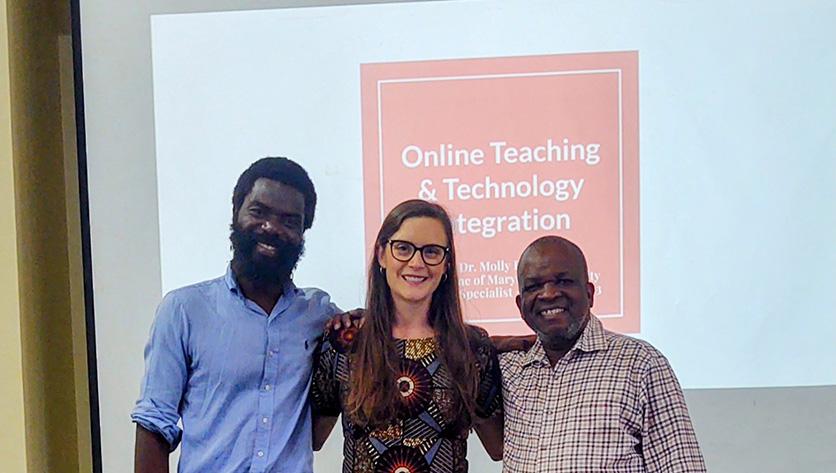Education Professor Trains Faculty in Africa Through Fulbright Specialist Program

By: Erik Pedersen, Senior Communications Manager
BALTIMORE – A Notre Dame of Maryland University education faculty member completed a life-changing experience in Malawi, a landlocked country located in southeastern Africa, where she taught professors innovative teaching and learning strategies as part of the U.S. Department of State’s Fulbright Specialist Program.
Dr. Molly Dunn, an assistant professor in NDMU’s School of Education, shared her expertise at the Lilongwe University of Agriculture and Natural Resources (LUANAR) for four weeks in January. While there, she provided valuable professional development to educators at the institution while launching long-term initiatives to expand virtual instruction capabilities and create a Center for Teaching and Learning.
“I coached, mentored, and provided instructional support,” Dr. Dunn said. “I presented workshops on several topics, including best practice pedagogy, curriculum design, student engagement, and motivation, etc., but the biggest need they had was in online teaching. That’s something I’ve done for five years at Notre Dame – our School of Education possessed online teaching structure even before COVID started – and they were most appreciative of the support in building up their capacity in that area.”
The Fulbright Specialist Program selects expert professionals who have the potential to make a significant contribution to organizations abroad. The program aims to provide a short-term, on-demand resource to international host organizations, and it encourages Fulbright Specialists to continue their work with host institutions in the years after their initial exchange. Dr. Dunn, who was selected for the program in December 2021, is one of over 400 U.S. citizens currently involved in the initiative.
Malawi is ranked 169th out of 191 countries in the latest Human Development Index rankings, a measure of a country’s achievement in key factors, such as long and healthy life, education, and a decent standard of living. It has a predominantly agricultural economy, and over 80 percent of the population engages in subsistence farming with limited infrastructure available at their disposal.
“I knew that many people relied on subsistence farming, but I hadn’t realized how undeveloped the infrastructure was,” Dr. Dunn said. “At the university, I observed groundskeepers chop grass with machetes, and when looking out at the fields, I never saw a combine or tractor, nor beasts of burden. There was very little mechanization.”
Malawi’s government established the university just over 10 years ago to help address these issues and educate its students on agricultural best practices. Dr. Dunn’s role was to help provide the school’s Natural Resource College professors, who are experts in areas such as engineering, environmental science, forestry, and aquaculture, with training on how to best educate students on those topics.
During her time in Malawi, however, Dr. Dunn quickly realized that her commitment to the university and its surrounding areas was going to extend beyond her four-week Fulbright term.
“I fell in love with the people there,” she said. “I had heard that Malawi was known as the Warm Heart of Africa, but I had no idea what that looked like until I visited. Moving forward, I want to find ways where I can continue to help, and return some of the love that everyone showed me.”
One way that Dr. Dunn plans to continue her work with the university is through the launching of a Center for Teaching and Learning and its accompanying website which she helped create. The site, which is meant to provide a variety of resources for the school’s professors, will additionally allow her to involve NDMU School of Education students in the initiative.
“Our students have so much expertise,” Dr. Dunn said. “We have PhD and master’s students possessing a wealth of instructional talent. Next fall, my students will add projects to the website, such as on-demand presentations, research findings, and other shareable deliverables that they create as part of their coursework. This way, students “get more mileage” out of assignments, and the School of Education encourages service learning while living out the Notre Dame mission of educating leaders to transform the world.”
Dr. Dunn also has long-term goals to assist in Malawi beyond the university. She has reached out to Shannon Bachmann ’13, an NDMU alumna who serves as a board member at a non-profit in the country, to discuss potential ways to partner with her organization, and she is exploring opportunities to provide much needed resources for Malawi’s overpopulated village schools. Perhaps most importantly, Dr. Dunn will remain connected with a group of people who more than lived up to their reputation for kindness.
“I’m planning to return next summer with my husband and children,” Dr. Dunn said. “In addition to building upon infrastructure we laid in January, I want to show my sons, ages 4 and 7, the level of strength, character, and love from people who have so little. They are a true inspiration for us all.”
Established in 1895, Notre Dame of Maryland University (NDMU) is a private, Catholic institution in Baltimore, Maryland, with the mission to educate leaders to transform the world. Notre Dame has been named one of the best "Regional Universities North" by U.S. News & World Report.




